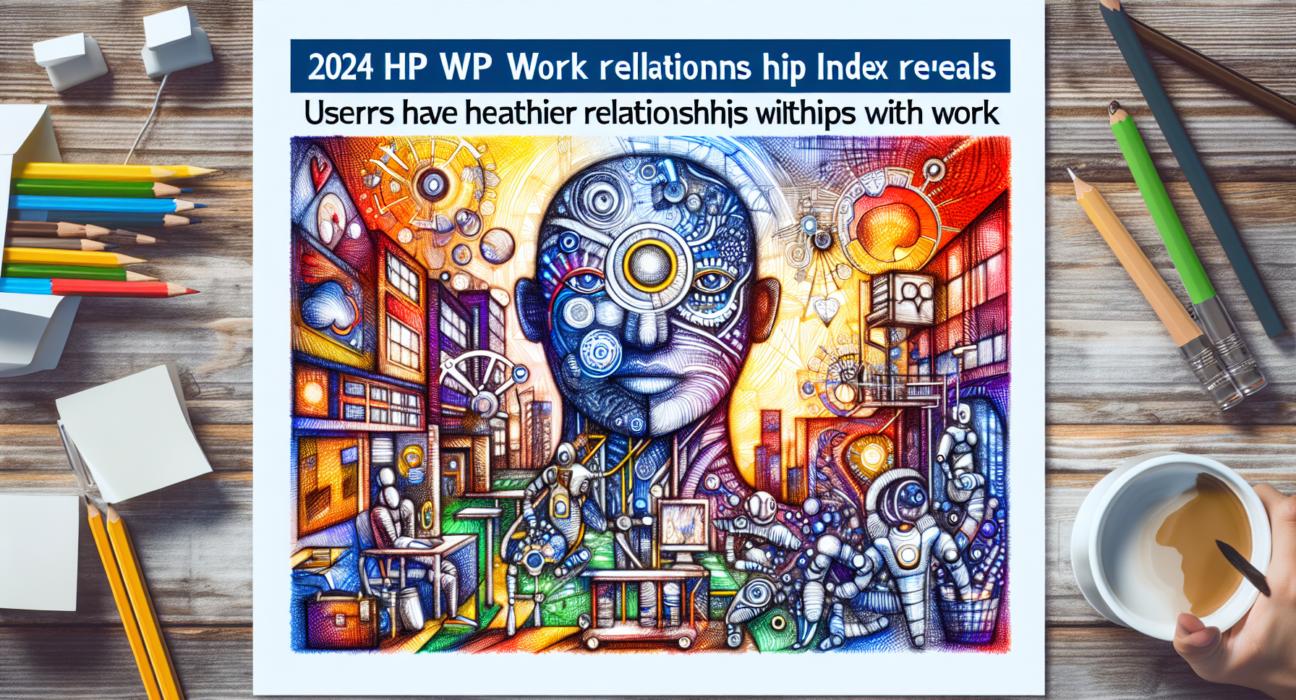According to the Second Annual Global Study released by HP Inc., workers who use AI are 11 points happier with their relationship with work compared to non-users. The study surveyed 15,600 respondents across industries in 12 countries and found that only 28% of knowledge workers have a healthy relationship with work, a one-point increase compared to 2023. However, there is hope as AI usage among knowledge workers surged to 66% in 2024, up from 38% last year and workers who use AI are 11 points happier with their relationship with work than their colleagues who don’t. The study also revealed that at least two-thirds of knowledge workers desire personalized work experiences, with 87% willing to forgo a portion of their salary to get it. Additionally, only 44% of leaders have confidence in their human skills, with female business leaders being significantly more confident than their male counterparts.
These findings were released today in the second annual HP Work Relationship Index (WRI), a comprehensive study that explores the world’s relationship with work. The study highlights the need for improvement in work relationships and points to AI and personalized work experiences as potential solutions to this issue.
“We know employer and employee expectations have evolved and we believe smart technology is key to meeting the needs of today’s workforce,” said Enrique Lores, President and CEO of HP Inc. “The future of work will be unlocked by using the power of AI to create solutions and experiences that drive business growth and enable individuals to achieve personal and professional fulfillment.”
Customized Work Experiences Can Improve Work Relationships
Continuing its research into people’s connections to work, the study in its second year delved into various aspects such as the impact of work on their lives, their capabilities, resources, work environments, and their expectations of leadership. The findings of WRI’s research this year highlight a significant universal requirement among knowledge workers: personalized work experiences.
The majority of workers are seeking personalized work experiences, such as customized workspaces, access to preferred technologies, and flexible working environments. These experiences are essential for enhancing work relationships and have positive effects on both employees and businesses.
The majority of knowledge workers express a strong desire for work that is tailored to their personal needs and preferences. In fact, 64% believe that personalized work would increase their investment in their company’s growth, while 69% think it would improve their overall well-being. Additionally, 68% of knowledge workers stated that personalized work would incentivize them to stay with their current employers longer. This desire for personalization is so strong that 87% of knowledge workers would be willing to forgo part of their salary for it. On average, workers would be willing to give up to 14% of their salary, with Gen Z workers willing to give up as much as 19%.
AI is Transforming the Work Experience for Knowledge Workers
According to recent data, the use of AI among knowledge workers has increased to 66% in 2024, highlighting the positive impact it has on their work:
- 73% have found that AI makes their jobs easier and nearly 7-in-10 (69%) are customizing their use of AI to improve productivity.
- 60% believe that AI is essential in maintaining work-life balance.
- 68% see AI as a way to create new opportunities for enjoying work.
- 73% agree that a better understanding of AI will help them advance in their careers.
Additionally, workers who use AI report being +11-points happier with their work, highlighting the need to integrate AI into their work environment sooner rather than later, as non-AI users are increasingly concerned about job replacement by AI.
Business Leaders’ Confidence Wanes; Female Leaders Shine
While the global scale shows little change, countries with an increased work relationship index saw slight improvements across the six key drivers of a healthy work relationship, particularly in Leadership and Fulfillment. This year’s index shows that trust in senior leadership is crucial for a healthy work relationship, but there is a gap between the recognition of the importance of human skills (such as mindfulness, self-awareness, communication, creative thinking, resilience, empathy, and emotional intelligence) and leaders’ confidence in delivering them.
The research this year revealed an interesting finding: female leaders seem to have a higher level of confidence in both their hard skills (technical, computer, presentation, etc.) and human skills compared to their male counterparts. On average, female business leaders are +10 points more confident in their hard skills and +13 points more confident in human skills. What’s even more impressive is that their confidence in both skills has grown over the past year, with a +10-point increase in human skills and a +4-point increase in hard skills. In contrast, confidence among male business leaders has remained stagnant in human skills and decreased in hard skills by -3 points. This sheds light on the potential for female leaders to lead the way in demonstrating empathy and strong human skills in the workplace.
If you would like to learn more about the HP Work Relationship Index, please visit the WRI website. To access the full report, you can visit the HP Newsroom.
Metodologia
HP zleciło przeprowadzenie badania online, które było zarządzane przez Edelman Data & Intelligence (DXI) i odbyło się między 10 maja a 21 czerwca 2024 roku w 12 krajach: USA, Francji, Indii, Wielkiej Brytanii, Niemczech, Hiszpanii, Australii, Japonii, Meksyku, Brazylii, Kanadzie i Indonezji. W sumie HP przeprowadziło ankietę wśród 15 600 respondentów – 12 000 pracowników wiedzy (po 1 000 w każdym kraju); 2 400 osób podejmujących decyzje w zakresie technologii informatycznych (po 200 w każdym kraju); oraz 1 200 liderów biznesu (po 100 w każdym kraju).
Źródło: pap-mediaroom.pl
